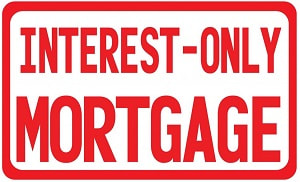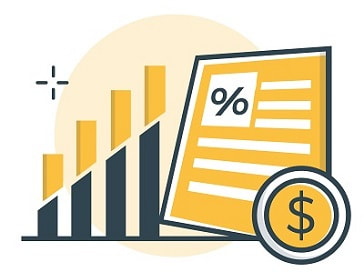Interest-Only Mortgages
This guide explains how an interest-only mortgage works, the pros, cons, costs, risks and the latest interest rates from banks
Updated 12 July 2024
What is an interest-only mortgage?
An interest-only mortgage is a loan which requires the borrower to pay the interest charged on the loan, and not the amount borrowed. The borrower only repays the loan when the term finishes. As an example, if you take a $100,000 interest-only mortgage at a 6% interest rate for three years, you pay $500 a month ($6,000 a year, divided by 12 months), which is the interest cost. At the end of the three years, you repay the original $100,000 or re-mortgage the loan.
Looking for an interest-only mortgage calculator? Our tool has everything you need for making important decisions.
Looking for an interest-only mortgage calculator? Our tool has everything you need for making important decisions.
Summary of interest-only mortgages
To fully explain interest-only mortgages and what you need to know, this guide covers:
- An interest-only mortgage is very similar to a standard 'principal and interest' mortgage in that you own the property. There is one big difference - interest-only mortgages don't require any principal repayment until the end of the term.
- Many property investors finance their mortgages on an interest-only basis - Stuff.co.nz reported that in 2016, 40% of new mortgages were interest-only.
- If you can't repay the amount borrowed under an interest-only mortgage when the term ends, you will need to re-mortgage or sell the property.
- Interest-only mortgages have a lot of advantages, but there are risks - we discuss these in detail below.
- Banks don't generally publish their interest-only mortgage rates, meaning you will need to contact every lender to make a fair comparison. Usually, the offers are more likely to resemble floating rates than fixed rates.
- A popular alternative to an interest-only mortgage is a short-term repayment mortgage - you can get a lower interest rate for 1-2 years, and re-mortgage after that to suit your needs. In that time, you'll repay principal, but it could work out cheaper overall. For example, a $500,000 mortgage with a fixed 2-year mortgage at 3.99% ($2,484/month over 30 years) is cheaper on all accounts than a 3-year interest-only mortgage at 5.99% ($2,496/month).
- In our view, borrowers who routinely re-mortgage at interest-only terms, and never pay off their mortgage are, in effect, renting from the bank.
To fully explain interest-only mortgages and what you need to know, this guide covers:
Interest-Only Mortgages vs Repayment Mortgages
There are two ways to repay a mortgage:
In both options, you own the property, with this being the lender's security for the mortgage. There is very little difference other than the fact that interest-only mortgages don't require the borrower to repay the original loan every month. This means the mortgage payment is a lot lower. Our example illustrates this in detail:
More details: Visit our Interest-only Mortgage Calculator
- Repayment - you pay the lender a fixed amount every month which includes a portion of the original loan, as well as interest costs. As long as the payments are made, you are guaranteed to pay the entire loan off at the end of the term.
- Interest-only - as you only pay the interest on the loan, at the end of the loan you will owe the same amount you originally borrowed.
In both options, you own the property, with this being the lender's security for the mortgage. There is very little difference other than the fact that interest-only mortgages don't require the borrower to repay the original loan every month. This means the mortgage payment is a lot lower. Our example illustrates this in detail:
- Phil borrows $500,000 on an interest-only basis to buy a house, with a 25-year term at an interest rate of 5%.
- If Phil repays the mortgage on an interest-only basis, he pays $2,083 a month
- If Phil repays the mortgage on a prepayment basis, he pays $2,923 a month.
- We can see that the interest-only mortgage is a lot more affordable on a monthly basis. But there is a shortcoming - after 25 years Phil would own the house outright if he had a repayment mortgage, yet an interest-only mortgage would see Phil still owe the lender $500,000
- Repayment mortgages have the advantage of reducing the loan owed over time, and therefore the amount of interest charged.
More details: Visit our Interest-only Mortgage Calculator
Who uses Interest-Only Mortgages in New Zealand?
1. Property Investors (i.e. landlords)
Many property investors finance their mortgages on an interest-only basis - Stuff.co.nz reported that in 2016, 40% of new mortgages were interest-only. Banks require a deposit, but the terms of an interest-only mortgage are attractive to landlords. Firstly, the repayments are a lot lower, so rental income can cover the monthly payments to the lender. Secondly, the IRD allows interest expenses to be tax deducted meaning the cost of financing is much lower.
2. Owner-occupier homeowners
Many homeowners use repayment mortgages, with interest-only being relatively uncommon. In cases where a borrower buys a section and build, the costs to build will often be lent on interest-only terms. However, once completed and the total borrowing is finalised, the homeowner will re-mortgage and get a repayment mortgage. Banks don't advertise their interest-only rates, terms and conditions, and ultimately encourage borrowers into repayment mortgages.
A brief history of interest-only mortgages
Many property investors finance their mortgages on an interest-only basis - Stuff.co.nz reported that in 2016, 40% of new mortgages were interest-only. Banks require a deposit, but the terms of an interest-only mortgage are attractive to landlords. Firstly, the repayments are a lot lower, so rental income can cover the monthly payments to the lender. Secondly, the IRD allows interest expenses to be tax deducted meaning the cost of financing is much lower.
2. Owner-occupier homeowners
Many homeowners use repayment mortgages, with interest-only being relatively uncommon. In cases where a borrower buys a section and build, the costs to build will often be lent on interest-only terms. However, once completed and the total borrowing is finalised, the homeowner will re-mortgage and get a repayment mortgage. Banks don't advertise their interest-only rates, terms and conditions, and ultimately encourage borrowers into repayment mortgages.
A brief history of interest-only mortgages
- Interest-only lending has been around for decades, but the number of mortgages taken out leading up to the 2008 financial crises led to a major meltdown when property prices sank and borrowers struggled to meet interest payments.
- Today, the housing market is again uncertain. While a capital gains tax is off the table, global economic conditions, New Zealand law changes and many other factors have affected demand for home ownership.
- The Reserve Bank is monitoring the exposure banks have to interest-only lending. Should house prices drop 10%, there could be serious trouble for lenders and borrowers alike.
- One thing is clear with interest-only mortgages - unless you can re-mortgage at the end of the term, either to another interest-only mortgage or a repayment mortgage, you will have to sell the property to pay off your mortgage.
What are my options if I have an interest-only mortgage?
If you have an interest-only mortgage, you will need to be able to repay what you have borrowed at the end of the term. You can do this in a number of ways:
If you are struggling with interest-only repayments right now, don't ignore the problem
The worst thing to do is to do nothing at all. If you are concerned about repaying your interest-only mortgage at the end of the term, it's best to look at solutions now and not later. The closer you get to the mortgage end date, the few options you will have available. Talking to your lender about your options immediately is in everyone's interests.
- Move to a repayment mortgage - you'll need to be approved by your lender to make sure you can meet the increased repayments. The advantage is that your overall borrowing will drop every month, and at the end of the term your loan will be repaid.
- Pay off your mortgage with a lump sum, which is usually only an option if you have liquidated another asset.
- Re-negotiate an interest-only mortgage. It can help your application if you lower the borrowing amount by making a lump-sum payment and put more equity into the underlying property.
If you are struggling with interest-only repayments right now, don't ignore the problem
The worst thing to do is to do nothing at all. If you are concerned about repaying your interest-only mortgage at the end of the term, it's best to look at solutions now and not later. The closer you get to the mortgage end date, the few options you will have available. Talking to your lender about your options immediately is in everyone's interests.
Advantages of an Interest-Only Mortgage
Interest-only mortgages can work for you in certain situations, and the following list is some examples of when this may be:
- You want to avoid rising house prices: The market has cooled off throughout New Zealand, but when the market was hot, speculative property investors used interest-only loans to buy property and flip it quickly at a profit. This only works in the short-term, and those owning property when the market takes a dip are burned first.
- Repayment freedom: The terms are more flexible than repayment mortgages and you won't be penalised for making a capital repayment. This means you can make repayments, and lower your overall mortgage balance, whenever you like. This works well for homeowners who have variable income, allowing them to repay capital in some months and not others while reducing their mortgage balance overall.
- You select interest-only as an investment strategy: Interest-only payments is a lot cheaper than making capital repayments, and it also frees up your money for other investments. If this is the case, an interest-only mortgage is an investment decision.
- Tax-deductible advantages: Property investors, i.e. not owner-occupiers, can deduct their interest costs on an investment property. If you have rental income, you can offset interest costs to lower your total income tax. If you had a repayment mortgage, only the interest component would be tax deductible.
- You expect your income to rise: If you know your income is about to rise, for example, a promotion or new job, an interest-only mortgage can give you all the benefits of home ownership with more affordable monthly payments. You can then make lump sum repayments until your term ends, whereby you can apply for a repayment mortgage.
Disadvantages of an Interest-Only Mortgage
Interest-only mortgages are high risk - get it wrong and you can be stuck with an expensive loan that costs more than you get in return. If circumstances change before the term expires and these affect your ability to re-mortgage, things can get messy. The following list outlines some disadvantages:
- There is no equity growth: Interest-only mortgages are not designed to help a homeowner grow their equity in a property. Unless extra payments are made, or the value of the property increases, then the homeowner will still owe a lot of money to the lender once the mortgage term ends.
- House prices fall: Despite the effects on house prices caused by the 2008 financial crisis, people forget house prices fall. If you have an interest-only mortgage and the value of the property slumps, you could be in negative equity (meaning your mortgage is bigger than the value of the property) and be saddled with a big debt for the long term.
- The interest rate could be variable, and may be much higher than standard 2-year and 5-year repayment mortgage rates: If the housing market is turbulent, lenders may want to limit their risk and require either big deposits, or charge higher-than-market interest rates. If you agree to an interest-only mortgage with a variable rate, you forgo the security of a fixed-term mortgage and risk rising interest rates and ultimately higher monthly payments.
- Not every lender offers interest-only mortgages: Or if they do, it may not be on terms that suit you. Banks don't actively advertise interest-free mortgages, so you will need to make enquiries with potential lenders well in advance of buying a property.
- The debt still needs to be paid off: This may not apply to an investment property, but you will almost certainly want to pay off your residential home. Interest-only mortgages are not designed to help you achieve that goal. On a day-to-day basis, having a cheaper interest-only mortgage means your disposable income is higher than it would be with a repayment mortgage. There is a risk that your spending habits increase and don't take into account that you have to repay the original debt in full.
Ready to Apply for an Interest-Only Home Loan?
Consider a Mortgage Broker - They Usually Save Time and Money
Mortgage brokers are popular and don't charge a fee. Their service goes beyond what a bank offers by comparing a number of lenders to find the best deal for your circumstances.
We've shortlisted top-rated mortgage brokers who go the distance for their clients in select cities around New Zealand:
We've shortlisted top-rated mortgage brokers who go the distance for their clients in select cities around New Zealand:
5 Must-Know Interest-Only Mortgage Facts
Interest-only mortgages make the total cost of borrowing higher than repayment mortgagesThe reason is simple - because you don't pay off any principal, interest costs keep being incurred. This example demonstrates what happens:
Are interest-only mortgages ever a good option for homeowners? It depends. An interest-only mortgage gets you on the 'property ladder', and in some situations, an interest-only mortgage can be cheaper than renting. You own your home, and have the option to switch to a repayment mortgage as well as paying down cash amounts that you save. |
Interest-only mortgages can increase home equity if you save responsibly AND the housing market risesThis is best explained as a case study. Take the example of Annabel and Max, who have a $100,000 deposit and buy a house for $600,000.
|
If house prices fall, interest-only mortgages will be very problematicHouse price rises are cooling off, and falling house prices mean you could potentially owe more to the lender than the house is worth. It's a sinking feeling, and sadly, it's all too real. Take an example:
In our view, borrowers who routinely re-mortgage at interest-only terms and never pay off their mortgage are, in effect, renting from the bank. |
Banks do not publish interest-only mortgage ratesIn a survey by interest.co.nz, all major banks confirmed they offer interest-free mortgages for a maximum term of between 3 and 10 years, with 5 years being the most common term. Most of the banks confirmed that their interest-only activity related primarily to investment situations. Because of the niche nature of interest-only mortgages, no banks currently publish their interest rates. To get a quote, you will need to contact a bank directly.
|
Switching to repayment mortgages can be unaffordableIf your interest-only mortgage changes to a repayment mortgage, your monthly mortgage costs can go up 35% (or higher) in some cases. If you find yourself struggling to make repayments, contacting your lender immediately is critical. There are ways to make repayments more manageable, including:
Remember, if you are negotiating a repayment plan, make sure you can actually afford the proposed terms. It is pointless to agree to a monthly repayment amount if you can't afford it. In all cases, facing up to a problem right away helps find a solution before bigger problems arise. For more details, our debt help guide covers the options and rights available to borrowers. |
Reminder - If you are considering an interest-only mortgage, consider very carefully about whether it is right for you
Related guides:
- Interest-only Mortgage Calculator
- Mortgage Refinance Calculator
- Top 10 Mortgage Interest Rates
- Fixed or Floating Mortgage Rate Calculator
- How Much Can I Borrow?
- 40 Must-Know House Buying Tips
- Mortgage Brokers
- Our What is the OCR guide helps explain why interest rates go up and down










